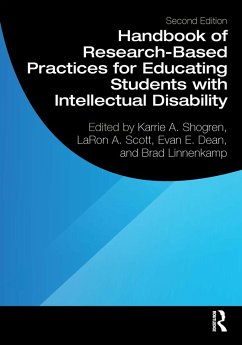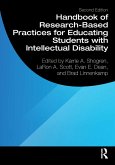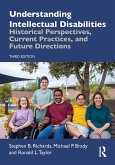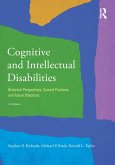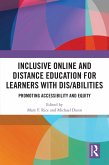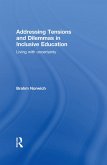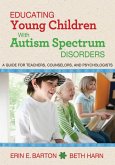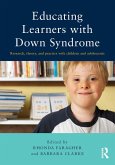Handbook of Research-Based Practices for Educating Students with Intellectual Disability (eBook, ePUB)
Redaktion: Shogren, Karrie A.; Linnenkamp, Brad; Dean, Evan E.; Scott, LaRon A.
108,95 €
108,95 €
inkl. MwSt.
Sofort per Download lieferbar

54 °P sammeln
108,95 €
Als Download kaufen

108,95 €
inkl. MwSt.
Sofort per Download lieferbar

54 °P sammeln
Jetzt verschenken
Alle Infos zum eBook verschenken
108,95 €
inkl. MwSt.
Sofort per Download lieferbar
Alle Infos zum eBook verschenken

54 °P sammeln
Handbook of Research-Based Practices for Educating Students with Intellectual Disability (eBook, ePUB)
Redaktion: Shogren, Karrie A.; Linnenkamp, Brad; Dean, Evan E.; Scott, LaRon A.
- Format: ePub
- Merkliste
- Auf die Merkliste
- Bewerten Bewerten
- Teilen
- Produkt teilen
- Produkterinnerung
- Produkterinnerung

Bitte loggen Sie sich zunächst in Ihr Kundenkonto ein oder registrieren Sie sich bei
bücher.de, um das eBook-Abo tolino select nutzen zu können.
Hier können Sie sich einloggen
Hier können Sie sich einloggen
Sie sind bereits eingeloggt. Klicken Sie auf 2. tolino select Abo, um fortzufahren.

Bitte loggen Sie sich zunächst in Ihr Kundenkonto ein oder registrieren Sie sich bei bücher.de, um das eBook-Abo tolino select nutzen zu können.
Now in its second edition, this comprehensive handbook emphasizes research-based practices for educating students with intellectual disability across the life course, from early childhood supports through the transition to adulthood.
- Geräte: eReader
- mit Kopierschutz
- eBook Hilfe
Andere Kunden interessierten sich auch für
![Handbook of Research-Based Practices for Educating Students with Intellectual Disability (eBook, PDF) Handbook of Research-Based Practices for Educating Students with Intellectual Disability (eBook, PDF)]() Handbook of Research-Based Practices for Educating Students with Intellectual Disability (eBook, PDF)108,95 €
Handbook of Research-Based Practices for Educating Students with Intellectual Disability (eBook, PDF)108,95 €![Understanding Intellectual Disabilities (eBook, ePUB) Understanding Intellectual Disabilities (eBook, ePUB)]() Stephen B. RichardsUnderstanding Intellectual Disabilities (eBook, ePUB)77,95 €
Stephen B. RichardsUnderstanding Intellectual Disabilities (eBook, ePUB)77,95 €![Cognitive and Intellectual Disabilities (eBook, ePUB) Cognitive and Intellectual Disabilities (eBook, ePUB)]() Stephen B. RichardsCognitive and Intellectual Disabilities (eBook, ePUB)108,95 €
Stephen B. RichardsCognitive and Intellectual Disabilities (eBook, ePUB)108,95 €![Inclusive Online and Distance Education for Learners with Dis/abilities (eBook, ePUB) Inclusive Online and Distance Education for Learners with Dis/abilities (eBook, ePUB)]() Inclusive Online and Distance Education for Learners with Dis/abilities (eBook, ePUB)40,95 €
Inclusive Online and Distance Education for Learners with Dis/abilities (eBook, ePUB)40,95 €![Addressing Tensions and Dilemmas in Inclusive Education (eBook, ePUB) Addressing Tensions and Dilemmas in Inclusive Education (eBook, ePUB)]() Brahm NorwichAddressing Tensions and Dilemmas in Inclusive Education (eBook, ePUB)39,95 €
Brahm NorwichAddressing Tensions and Dilemmas in Inclusive Education (eBook, ePUB)39,95 €![Educating Young Children with Autism Spectrum Disorders (eBook, ePUB) Educating Young Children with Autism Spectrum Disorders (eBook, ePUB)]() Erin E. BartonEducating Young Children with Autism Spectrum Disorders (eBook, ePUB)11,86 €
Erin E. BartonEducating Young Children with Autism Spectrum Disorders (eBook, ePUB)11,86 €![Educating Learners with Down Syndrome (eBook, ePUB) Educating Learners with Down Syndrome (eBook, ePUB)]() Educating Learners with Down Syndrome (eBook, ePUB)41,95 €
Educating Learners with Down Syndrome (eBook, ePUB)41,95 €-
-
-
Now in its second edition, this comprehensive handbook emphasizes research-based practices for educating students with intellectual disability across the life course, from early childhood supports through the transition to adulthood.
Hinweis: Dieser Artikel kann nur an eine deutsche Lieferadresse ausgeliefert werden.
Dieser Download kann aus rechtlichen Gründen nur mit Rechnungsadresse in A, B, BG, CY, CZ, D, DK, EW, E, FIN, F, GR, HR, H, IRL, I, LT, L, LR, M, NL, PL, P, R, S, SLO, SK ausgeliefert werden.
Hinweis: Dieser Artikel kann nur an eine deutsche Lieferadresse ausgeliefert werden.
Produktdetails
- Produktdetails
- Verlag: Taylor & Francis eBooks
- Erscheinungstermin: 10. September 2024
- Englisch
- ISBN-13: 9781040111000
- Artikelnr.: 72284731
- Verlag: Taylor & Francis eBooks
- Erscheinungstermin: 10. September 2024
- Englisch
- ISBN-13: 9781040111000
- Artikelnr.: 72284731
- Herstellerkennzeichnung Die Herstellerinformationen sind derzeit nicht verfügbar.
Karrie A. Shogren is Ross and Marianna Beach Distinguished Professor of Special Education, Director of the Kansas University Center on Developmental Disabilities (KUCDD), and Senior Scientist at the Schiefelbusch Life Span Institute, University of Kansas, USA. LaRon A. Scott is Associate Professor of Special Education in the Department of Curriculum, Instruction, & Special Education and Associate Dean for Diversity, Equity and Inclusion at the University of Virginia, USA. Evan E. Dean is Associate Director of the Kansas University Center on Developmental Disabilities and Assistant Research Professor at the Schiefelbusch Life Span Institute, University of Kansas, USA. Brad Linnenkamp is Assistant Researcher at the Kansas University Center on Developmental Disabilities (KUCDD), University of Kansas, USA. The editors would also like to acknowledge the contributions of Michael L. Wehmeyer to the first edition of this book.
Section I: Understanding Intellectual Disability 1. Our Lived Experiences with Language, Ableism, and Supports: Implications for the Education of People with Intellectual and Developmental Disabilities 2. Historical Understandings of Intellectual Disability and the Emergence of Special Education 3. Strengths-Based Approaches to Intellectual Disability 4. Intersectionality of Race/Ethnicity, Gender, Sexual Orientation, and Intellectual Disability Section II: Eligibility, Assessment, and Educational Planning 5. My Experiences with my IEP and Receiving Special Education Services 6. Assessment for Eligibility 7. Assessment for Educational Supports Planning 8. Assessment to Support Learning 9. Developing High Quality IEPs for Students with Intellectual Disability 10. Research and Practice for Transition: Bridging Academics and Transition Goals for Students with Intellectual Disability Section III: Supporting Student Learning in Inclusive Settings 11. Our Lived Experiences with Receiving Supports in Inclusive Education Settings and Preparing for Life After High School 12. Teaching Reading and Literacy to Students with Intellectual Disability 13. Science, Technology, Engineering, and Mathematics (STEM) for Students with Intellectual Disability 14. Positive Behavior Interventions and Supports for Students with Intellectual Disability: Ensuring Culturally Responsive, Trauma-Informed, Person-Centered Supports 15. Building Social Networks 16. Self-Determination 17. College and Career Readiness Access and Support for Youth with Intellectual Disability Section IV: Creating Inclusive Schools and Classrooms 18. My Lived Experience with Inclusion, Belonging, and Collaboration in Schools: Implications for Policy and Practice 19. Supporting Digital Participation of Youth with Intellectual Disability 20. Family Supports and Students with Intellectual and Developmental Disabilities 21. Collaborating to Support a Successful Transition from School into Adult Life 22. Working Conditions and Strategies to Support the Quality of Special Education Teachers Serving Students with Intellectual Disability 23. Creating Rightful Presence in School Communities Section V: Education Across the Lifespan 24. What Makes Me Successful in Adulthood 25. Supporting Young Children through the Early Childhood Years 26. Fostering Equity and Inclusion in Secondary Education for Students with Intellectual Disability: Guidelines for Practice and Research 27. Postsecondary Education for Students with Intellectual Disability 28. Transitioning to Employment: A World of Opportunity for Youth and Young Adults with Intellectual Disability 29. Health and Healthcare Transition 30. Transition Practices to Promote Active Citizenship of Youth with Intellectual and Developmental Disabilities
Section I: Understanding Intellectual Disability 1. Our Lived Experiences with Language, Ableism, and Supports: Implications for the Education of People with Intellectual and Developmental Disabilities 2. Historical Understandings of Intellectual Disability and the Emergence of Special Education 3. Strengths-Based Approaches to Intellectual Disability 4. Intersectionality of Race/Ethnicity, Gender, Sexual Orientation, and Intellectual Disability Section II: Eligibility, Assessment, and Educational Planning 5. My Experiences with my IEP and Receiving Special Education Services 6. Assessment for Eligibility 7. Assessment for Educational Supports Planning 8. Assessment to Support Learning 9. Developing High Quality IEPs for Students with Intellectual Disability 10. Research and Practice for Transition: Bridging Academics and Transition Goals for Students with Intellectual Disability Section III: Supporting Student Learning in Inclusive Settings 11. Our Lived Experiences with Receiving Supports in Inclusive Education Settings and Preparing for Life After High School 12. Teaching Reading and Literacy to Students with Intellectual Disability 13. Science, Technology, Engineering, and Mathematics (STEM) for Students with Intellectual Disability 14. Positive Behavior Interventions and Supports for Students with Intellectual Disability: Ensuring Culturally Responsive, Trauma-Informed, Person-Centered Supports 15. Building Social Networks 16. Self-Determination 17. College and Career Readiness Access and Support for Youth with Intellectual Disability Section IV: Creating Inclusive Schools and Classrooms 18. My Lived Experience with Inclusion, Belonging, and Collaboration in Schools: Implications for Policy and Practice 19. Supporting Digital Participation of Youth with Intellectual Disability 20. Family Supports and Students with Intellectual and Developmental Disabilities 21. Collaborating to Support a Successful Transition from School into Adult Life 22. Working Conditions and Strategies to Support the Quality of Special Education Teachers Serving Students with Intellectual Disability 23. Creating Rightful Presence in School Communities Section V: Education Across the Lifespan 24. What Makes Me Successful in Adulthood 25. Supporting Young Children through the Early Childhood Years 26. Fostering Equity and Inclusion in Secondary Education for Students with Intellectual Disability: Guidelines for Practice and Research 27. Postsecondary Education for Students with Intellectual Disability 28. Transitioning to Employment: A World of Opportunity for Youth and Young Adults with Intellectual Disability 29. Health and Healthcare Transition 30. Transition Practices to Promote Active Citizenship of Youth with Intellectual and Developmental Disabilities
